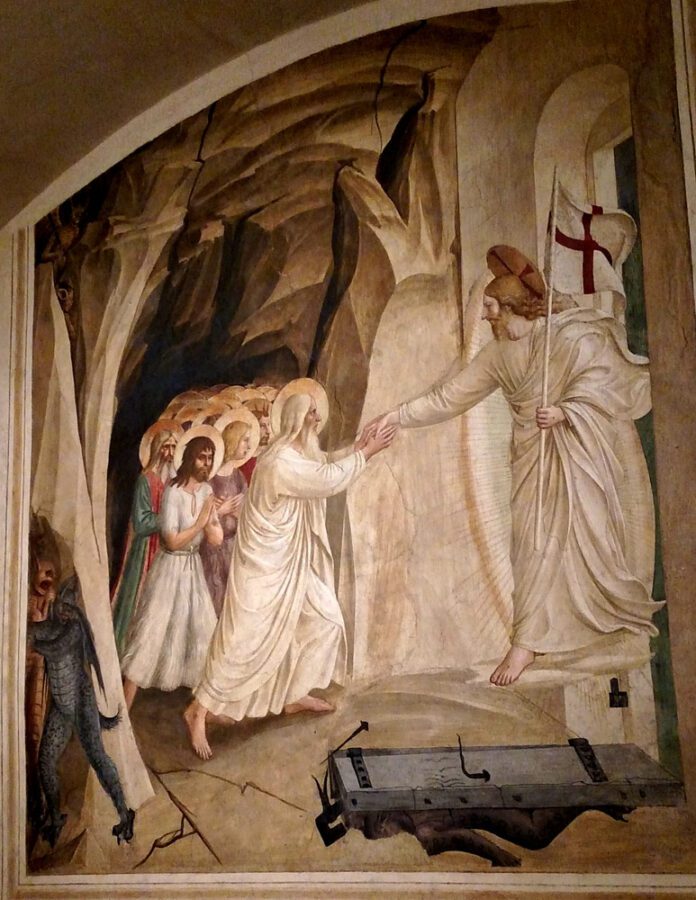
Many of us know the basics of Holy Week. So, what is so special about a few extra-long liturgies? I mean, we know how it ends. Right? NO. The Church does some interesting things during this most remarkable week. The Holy Week liturgies slow us down and give us a chance, once again, to cooperate with the grace of God.
Are you struggling to keep even the simplest of Lenten penances? It is not too late.
This week can still be holy, but you must participate and get in the boat. This is the week of all the weeks when you want to go to Mass every day. Each day of the Holy Week tries to teach us something about the mystery of the Passion. So, let’s talk about some of these essential lessons.
Palm Sunday of the Passion of the Lord: No, this is not just the Sunday whereby the Church gives you license to be distracted during Mass and make a cross out of your palm branch. What makes Palm Sunday so dramatic is the fast-paced shift from jubilation to condemnation. In one liturgy, the people of God proclaim “All Glory, Laud, and Honor to thee Redeemer King” at the beginning of Mass to the Gospel proclamation of “Crucify Him! Crucify Him! Crucify Him!” How often is this quick turnover – from grace into sin – the case in our lives? Does Jesus say anything back to us?
Holy Monday, Holy Tuesday and Holy Wednesday/Spy Wednesday: Many pass over these days when thinking about Holy Week, but these are not just a place holder but a bridge from the inside city of jubilation of Laud and Glory to outcast hills of fiery wrath that is the crucifixion. Recall how many times in the season of Ordinary Time Jesus repeatedly says these words, “Tell no one.” The events of these three days remind us why. Jesus returns to the scene of His crime, the raising of Lazarus (John 11). He knows that being only a few miles from Jerusalem would instill hostility. Yet, he still comes. Then, on Holy Tuesday and Holy Wednesday, we are reminded of the agent of Jesus’ betrayal, Judas. Tradition calls Wednesday of Holy Week “Spy Wednesday” because it marks the day when Judas went off to betray Jesus. Yet the plan to kill the Messiah began years before (John 11:53). How many times in the patterns of sin can you remember “the moment.” That moment when you choose to forget. What is Jesus’ response to your betrayal?
Holy Thursday: This day celebrates two sacramental mysteries in the Church, the Holy Eucharist and the Priesthood of Jesus Christ. What connects these two sacraments is the recognition of how Christ still operates as the chief priest of the Church. Christ’s sacrifice, therefore, is not a fact of history but the animating principle of the Church. His sacrifice continues to give life to the Church, feeding the Church with His Body and His Blood and guiding the Church through His priesthood and its participating agents. This system may appear fragile to onlookers, but attending this liturgy reminds the faithful of the strength of Christ’s Church. How often do we forget that the Church is sustained not by personality or human power but by the power and authority of God? What does Jesus want to remind you about His authority?
Good Friday: The tabernacle is empty. The music is silent. The decorations are stripped. The liturgy is not even a Mass but a “service.” Yet, millions of Catholics around the world come. Why?
Good Friday is a great reset for our souls, especially those who feel lukewarm. Catholics typically love this day because the Church permits us to liturgically wallow in our sorrow. Yet, we are sorrowful not just for what we have done or not done. We are sorrowful because we finally get it. Our sins have an effect not just on us but on the whole world. How often do you forget that your sins have a communal impact on the Body of Christ? What does Jesus do to mitigate this effect?
Easter Vigil, The Mother of all Liturgies: How unfortunate it is in modernity when the length of time of this Mass is the most known fact about this liturgy. These rites and customs of the Vigil bring back the liturgical life of the Church. Darkness is overcome with blessed fire. Holy Water gushes forth like Living Water toward the baptized. Silence is broken with the full proclamation of the History of Salvation. There is no way I can fully describe what this liturgy can do for your spiritual life. However, if you are moved, I invite you to come and see the works of God, awesome deeds before the children of Adam (Psalms 66:5). How often do we give our Lord a chance to change our mourning into dancing and bring us back to life again? What miracles does Jesus hope to do for you this Easter?